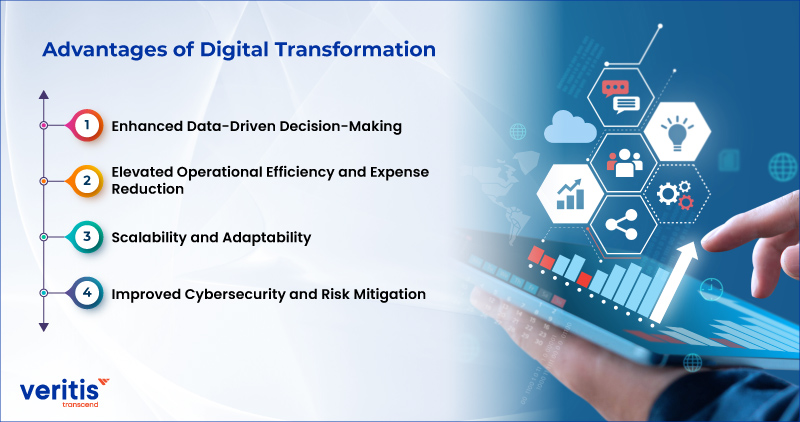
Transformation is today’s buzzword for every industry, meaning it’s time to up capabilities to meet the changing market demands. In a fast-paced environment where opportunities and technology are ever-changing, evolution is key to the success of any brand. It takes constant assessment, adjustment, and progress to stand out from competitors.
But what exactly does it mean to transform? Are business and digital transformation services the same thing? And if not, which is more crucial regarding business transformation vs digital transformation trends?
The short answer is that digital business transformation is part of a more significant business transformation, but each has unique subtleties that brands need to embrace. Two terms that make this word more powerful are Business and Digital. Both fall under ‘demand of the day and the ‘need of the hour’ for almost every organization globally.
Some of the stats related to business transformation and digital transformation are:
Business Transformation:
- 63% of organizations are currently undergoing a business transformation. (Source: IDC, 2023)
- 70% of CEOs believe business transformation is essential for their company’s survival. (Source: PwC, 2023)
- The average global spending on business transformation is expected to reach USD 1.3 trillion by 2025. (Source: Gartner, 2023)
Digital Transformation:
- 90% of organizations have a digital business transformation strategy in place. (Source: IDC, 2023)
- 75% of CEOs believe digital transformation services are essential for their company’s growth. (Source: Deloitte, 2023)
- The global digital transformation market is anticipated to achieve a valuation of around USD 3.3 trillion by 2025. (Source: MarketsandMarkets, 2023)
In the realm of organizational evolution, the distinction between business transformation and digital transformation is pivotal. Business transformation entails a comprehensive revamp of an organization’s fundamental processes, strategies, and structures in response to market dynamics and strategic objectives, encompassing changes in culture, leadership, and business models.
In contrast, digital transformation, a subset of business transformation, is laser-focused on integrating digital technologies such as AI, cloud computing services, and data analytics to optimize efficiency, enhance customer experiences, and enable agile decision-making.
What is Business Transformation?
Business Transformation is a change management strategy that aligns people, processes, and technology to the organization’s core business objectives and future vision. Such an IT transformation naturally drives innovation and paves the way for new business strategies.
Business transformation often refers to primary corporate objectives, such as becoming a genuinely customer-centric firm, gaining strength as a serial acquisition, expanding into a worldwide partner, or becoming an agile corporation.
A business transformation consultant denotes a significant change in how a company operates. It entails adjustments to structures, incentives, mindset, processes, habits, core capabilities, and technology. Digital transformation technologies include IoT, robotics, artificial intelligence, virtual reality, drones, etc.
Business Transformation Encompasses Several Vital Types:
1) Process Transformation: This type focuses on enhancing operational efficiency and effectiveness by fostering improved collaboration among people, processes, and applications.
2) Business Model Transformation: This involves adopting a fresh perspective on business opportunities, driven by increasing revenue and enhancing the customer experience, often leveraging technology as a catalyst.
3) Cultural/Organizational Transformation: This type addresses the imperative of changing employee mindsets and the overall organizational culture to align with a modern vision.
4) Digital Transformation: It is an integral part of business transformation, encompassing all the digital-first elements mentioned earlier, as organizations seek to navigate the digital landscape effectively.
Useful Link: All You Need to Know About Technology Business Management
What is Digital Transformation?
The goal of digital transformation framework challenges is to alter how business is conducted using digital tools and platforms. It includes aspects of business transformation, although it might not always be about digital platforms. Digital transformation services company guides your business objectives.
Digital Transformation Management (DX) is the process of implementing digital initiatives. The focus of enterprise digital transformation consulting is on what businesses can do to become more digitally enabled, including technology for bringing in a new wave of change:
- Business and processes are held
- End-user interacts with the business/product for customer satisfaction
- Culture is developed/built organizational-wide, cross-functionally
The two transformations are different but go hand-in-hand for a successful business process transformation.
Digital Transformation Encompasses Four Primary Domains:
1) Process Transformation: This strategic approach modernizes business processes, services, and models by leveraging emerging technologies and applications, such as data analytics, to enhance information gathering and processing efficiency.
2) Business Model Transformation: By embracing technology, organizations can envision new revenue streams and elevate the customer experience, ushering in a fresh perspective on business opportunities and operations.
3) Domain Transformation: A successful shift into new business areas often necessitates rapidly adopting cutting-edge technologies, enabling organizations to expand their footprint and capabilities.
4) Information Systems Transformation: This involves a comprehensive overhaul of information management systems, encompassing updates to technology infrastructure, process enhancements, and staff capabilities to better adapt to the digital landscape.
Useful Link: Guide to Digital Transformation Technologies and Their Business Impact
How does Digital Transformation and Business Transformation Help?

As tools and integrated systems improve process efficiency and data accessibility, digitization has become the norm. It became synonymous with “business change” since adopting digital transformation services is always associated with technology implementation, operational effectiveness, and business model optimization. The term has come to mean “business change.” As a result, even minor platform upgrades can result in significant IT transformation, requiring user training, data migration, extensive testing across integration bridges, business approval, and potential interruption upon implementing the new solution.
The best digital technology in the world won’t help with business transformation or digital transformation companies if it isn’t adequately integrated into the business’s more extensive operations. After all, enhancing an inadequate customer experience with digital channels would only make it worse.
DX and digital business transformation services are the two most discussed terms as an effective means to drive business success.
They primarily help in:
- Overcoming emerging market challenges
- Leverage and capitalize on technology potential
- Enhanced business functioning
- Better service delivery
Organizations need DX and business transformation in the current scenario of improved regulations, increased globalization, and a dynamically changing technology landscape.
While business transformation consulting typically focuses on business and go-to-market models, digital business transformation strategy brings initiatives and technologies to support those efforts.
Why do Transformations fail?
The first and foremost reason behind business failure in implementing transformations is ‘misconception.’ The most common misunderstanding is ‘over-focus’ on technology as the first step.
Undermining cultural significance, most organizations prefer technology first to understand the existing gaps. However, success in technology implementation only happens on solid fundamentals.
So, the success of these IT transformations is solely dependent on the following factors:
- Organizational Readiness
- Employee openness and preparedness to change
- Management’s perspective of the company
- Change in marketing and sales strategies
- Change in supply chain management
Useful Link: Impact of Digital Transformation in Healthcare Industry
Benefits of Business Transformation and Digital Transformation
Business transformation and digital transformation are pivotal in facilitating business growth, enhancing operational efficiency, and fostering innovation. Let’s delve into the benefits of each of these transformative endeavors.
Advantages of Business Transformation

Let’s explore the benefits that business transformation brings:
1) Enhanced Flexibility and Adaptability
Business transformation empowers companies to bolster their flexibility and adaptability in the ever-changing market. Embracing change and maintaining an ongoing evolution allows organizations to swiftly respond to shifting market dynamics, evolving customer preferences, and emerging technologies. This heightened agility allows businesses to capitalize on new opportunities, streamline operations, and maintain a competitive edge.
2) Refined Operations and Increased Efficiency
Through business transformation, companies can streamline operations, eliminate inefficiencies, and elevate overall operational efficiency. By conducting thorough assessments of existing workflows and implementing industry best practices, organizations can optimize resource allocation, cut down on costs, and enhance productivity. This process optimization equips companies to achieve greater customer satisfaction levels and expedite the delivery of products and services.
3) Improved Customer Experience
A pivotal advantage of business transformation lies in its capacity to elevate the customer experience. By harmonizing business operations with customer requirements and inclinations, companies can boost customer satisfaction, bolster loyalty, and bolster customer retention. Organizations can position themselves as customer-centric entities by optimizing processes, personalizing interactions, and introducing innovative solutions, securing a competitive edge within the market.
4) Augmented Innovation and Expansion
Business transformation cultivates an environment of innovation within enterprises. Companies can stimulate innovation and propel growth by motivating employees to explore unconventional approaches, experiment with novel concepts, and embrace digital tools. This empowers organizations to discover fresh avenues for revenue generation, create distinctive products and services, and maintain relevance in a swiftly evolving market.
Useful Link: 8 Best Business Continuity Management Software Solutions
Advantages of Digital Transformation

Let’s delve into the benefits of digital transformation:
1) Enhanced Data-Driven Decision-Making
The digital transformation framework empowers organizations to gather, assess, and harness extensive data reserves to drive well-informed decision-making. Companies can extract valuable insights regarding customer behaviors, market dynamics, and operational efficiency using advanced analytics, machine learning, and artificial intelligence. This data-centric decision-making approach equips organizations to pinpoint avenues for growth, manage risks effectively, and fine-tune their business strategies.
2) Elevated Operational Efficiency and Expense Reduction
Businesses can substantially improve operational efficiency and cost reduction by integrating digital technologies and automating manual procedures. Digital transformation framework optimizes work processes, eradicates manual inaccuracies, and fosters effortless cross-departmental collaboration. Automating repetitive tasks liberates valuable time and diminishes the potential for errors, resulting in cost efficiencies and heightened productivity.
3) Scalability and Adaptability
The digital transformation journey allows organizations to scale and adapt to evolving business requirements. For instance, cloud computing facilitates rapid and efficient scaling of operations based on demand. This scalability empowers businesses to extend their footprint, serve a broader customer demographic, and explore new markets without significant infrastructure expenditure.
4) Improved Cybersecurity and Risk Mitigation
With the adoption of digital technologies, robust cybersecurity measures and efficient risk management have become essential. The digital transformation journey empowers organizations to deploy advanced security protocols, safeguard sensitive data, and fortify defenses against cyber threats. By seamlessly integrating cybersecurity into their digital framework, businesses can foster customer confidence, adhere to regulatory requirements, and adeptly address risk factors.
Useful Link: Guide to Digital Transformation Technologies and Their Business Impact
Differences Between Business Transformation and Digital Transformation
Business and digital transformation strategies are fundamentally dissimilar from one another. The key variations are shown in the following table:
| Parameters | Business Transformation | Digital Transformation |
| Definition | Business transformation is the initiative to alter the business model to make significant organizational changes. | The goal of a digital transformation platform is to use digital capabilities to fundamentally modify company operations. |
| Focus | The primary goal is to transform the company through a new business model. A company’s offerings, values, and identity are frequently fundamentally altered. | The primary goal is to improve the company’s digital capabilities to accomplish its stated business goals, resolve issues, and seize opportunities. |
| Sponsor | The CEO (or an appropriate executive) should sponsor a business transformation initiative. | The CTO (or an equivalent) should sponsor a Digital transformation journey program. |
| Scope | A business transformation program may include digital transformation. | Ideally, the business model shouldn’t be impacted by digital transformation strategy. |
| Trigger | The few potential triggers for business transformation include the following: 1. Significant changes in client perception, trend, and demand 2. Company offers might not be pertinent 3. Modification in the environment (business, social, and political) 4. Inability to sustain growth long enough to maintain operations 5. Competition | The few potential triggers for digital transformation services include the following: 1. Utilize technology as it exists to your company’s advantage. 2. Use digitalization to address business issues 3. Enhance its stakeholders’ experience (customers, suppliers, employees) 4. Enhance transparency 5. Enhance business efficiency |
Conclusion
The distinction between business transformation and digital transformation may seem subtle, yet it signifies a fundamental difference in approach. Business transformation encompasses a comprehensive restructuring of an organization’s core processes, strategies, and culture to adapt to shifting market dynamics.
On the other hand, digital transformation, a subset of business transformation, primarily leverages technology to optimize operations and enhance customer experiences. Veritis, the distinguished winner of the Stevie and Globee Business Awards, stands out as an expert in both these domains, offering a holistic range of services to help organizations navigate these transformative journeys effectively, ensuring success in an increasingly digital world.
Looking for Support? Schedule A Call
Also Read:
- 10 Factors That Can Drive Your ‘Digital Transformation’ Initiatives!
- 8 Factors That Drive Digital Transformation in Banking Industry
- Successful Digital Transformation: CEO’s Path to Digital Transformation Success
- Digital Transformation: 6 Key Takeaways from Success Stories!
- Guide to Digital Transformation Technologies and Their Business Impact
- Global Digital Transformation Market to Reach USD 1009.8 Billion by 2025